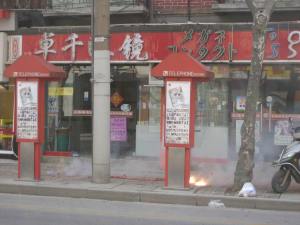The year of the Snake- rattle and shake!
The Chinese New Year, the Spring Festival, is approaching. The year of the Snake starts on February the 10th.The snake has according to a Chinese calendar:
“An inherent unique wisdom, love at the good things in life. Often rely on their own judgement. Suspicious in nature but cautious and alert at work. Possess a strong sense of responsibility, and having clear goals will progressively lead to success.” The calendar also says that 2013 will be a “year of trials and testings. Be firm and acquire wisdom through the difficulties”! It seems like it is pointing at the economic situation in Europe and US. Beware and be wise!
Traffic, traffic, traffic!
In China the Lunar New Year, or Spring Festival, means TRAFFIC, millions of people going home on roads, trains, and flights. Over 200 million people are on the road at the same time! It sure gets crowded. This is the big family reunion holiday in China, a whole week holiday from work, and usually a whole month holiday for students. For many migrant workers it is the only time of year to meet their parents or children.
Childhood memories of Chinese New Year (CNY) celebrations
Karin: Jie, what do you like the most about the Chinese New Year celebrations?
Jie: I have to say I liked it a lot when I was a kid— we lived in the traditional, cramped flats at that time, and the sound of firecrackers could be heard all day. We kids who were playing in the lane rushed into the flats when adults shouted, ‘firecrackers!’ with our hands on the ears. Though it seemed scary at times, the firecrackers became one of the sweet memories for CNY for us, especially after it was banned for the sake of safety.
Chinese New Year in Shanghai
Karin: I can also still remember the excitement from the Chinese New Year celebrations in Shanghai. There was a constant noise from firecrackers and especially on New Year´s Eve there were a lot of magnificent fireworks all over Shanghai. (see our previous blog Feb 2011). On the other hand it was curiously quiet in the streets in the daytime, since all the migrant workers had gone back to their home villages and many shops and restaurants were closed.
Red envelopes instead of gifts
Jie: I think the main difference between CNY and Christmas is the Christmas gift tradition, which is different from the Chinese New Year traditions, where kids get small red envelopes with money instead. But I think a kid, no matter how young, is always happy to receive gifts rather than money. When we were small we were not that interested in pocket money in red envelopes , since we were not aware of the benefits of money and we willingly handed them over to our parents!
Another sound from the CNY memory is from the Lion Dance and Dragon Dance tradition. The lion and dragon are believed to dispel evil and bring good luck, give good weather and good harvest—of course, we didn’t know that much as kids. We just enjoyed the hilarious atmosphere.
Nowadays, most city dwellers in China have moved out from small flats into apartment buildings, without knowing the names of the neighbors, with no lion and dragon dance scenes, sounds in the streets and fresh smell of the markets.
Ban Nian Huo – Shopping for the New Year holiday
Karin: At our Chinamirror blog we get a lot of search hits from the phrase “ban nian huo”. It means New Years shopping doesn it? What do you shop?
Jie: You’re right, Ban Nianhuo means shopping for CNY. Ban equals ‘to do’ while ‘Nianhuo’ means ‘ stuff for CNY’ such as food which brings good luck like sweet candy or flowers, new clothes, posters, red envelopes and so on. It’s interesting that with the booming of internet, people tend to Ban Nianhuo online now! But most of us still enjoy the atmosphere of going shopping with family!
Stressful parts of the Chinese New Year activities
Karin: What do you wish it could be less of at CNY? I suppose the holiday celebrations can be as stressful as the Christmas holidays in Sweden sometimes are?
Jie: Yes, it is a pity that CNY has become quite stressful for us nowadays. You know, Guanxi (people’s connection and relationship) is very important in China. As CNY is such an important festival, our agenda is packed with different feasts offered by business partners, with lots of wine drinking, sometimes almost every night. I’m quite overwhelmed by this. I heard someone say he had even attended four different feasts in one evening !
Yuan Xiao Jie – Lantern festival
Karin: I also noticed we get a lot of search hits for Yuan Xiao Jie , Lantern festival. It seems like people are very curious about that! We have written about it in a previous blog (Feb 2012) but can you add something about your personal associations of it?
Jie: Yuan Xiao Jie, or Lantern festival, is at the end of the 14 days New Year Celebrations. In ancient times, it was a special occasion for young boys and girls to go out and meet each other. I remember when I was a kid, I used to go to parks with my parents to enjoy the beautiful lanterns and solve the riddles. It was great fun for kids who are interested in literature like me!






